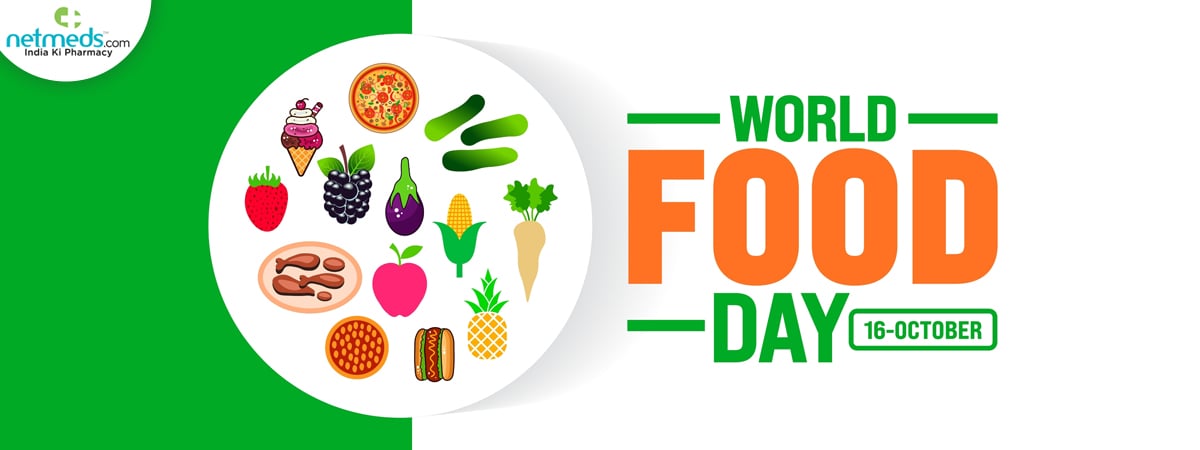Every year on October 16, the world celebrates World Food Day, marking the establishment of the Food and Agriculture Organisation (FAO) of the United Nations in 1945. This global campaign serves as a powerful reminder of our collective responsibility to ensure that no one goes hungry while also preserving the Earth's valuable resources for future generations. Every individual has a key role to play in recognising the vision of a world without hunger and malnutrition. We must ensure that sustainable eating habits are followed and make healthy choices to minimise food waste.

For Optimal Health And Well-Being Shop From Our Best-Selling Health Supplements
The theme for this year’s World Food Day 2025 is “Hand in Hand for Better Foods and a Better Future”. The real scenario is that in some places, the severity of food insecurity is overwhelming. Around 673 million people are living without food and are staying hungry. While in other parts of the world, alarmingly rising cases of obesity and a broad spectrum of food waste point to a system running out of balance, where abundance and absence often coexist side by side.
Meeting the growing needs of food across the global population calls for well-strategized teamwork, across borders, sectors and generations to come. This year marks the 80th anniversary of FAO.
Also Read: World Food Day 2024: Theme, Significance And Strategies To Eradicate Hunger
Significance
This event emphasises addressing the urgent issues such as hunger, malnutrition, climate change, and unsustainable food systems. World Food Day 2025 serves as a call to action to rethink how food is produced, distributed, and consumed.
Despite global progress and development, millions still lack access to adequate nutrition and proper food.
Food systems are under pressure from climate change, soil degradation, and water scarcity, thereby lacking sustainable food delivery.
From governments and businesses to individuals, everyone has a role in building a fairer and more resilient food future.
World Food Day 2025 works to raise awareness, strategize policy change, and follow small but meaningful actions in our daily lives to build a hunger-free environment.
5 Effective Measures to Prevent Food Waste
Food waste is one of the most concerning issues in today’s food management systems. Around 1/3 of all food produced globally is wasted, while millions go hungry. Here we have curated five sustainable practices that individuals, households, and communities can adopt:
Smart Meal Planning
Tailored meal planning according to the needs of the families or communities ahead helps to minimise unnecessary purchases. Making a shopping list and buying only what is required prevents food from wasting or spoiling before use.
Storing Food Properly
Fresh produce like fruits, vegetables, and grains can get rancid or spoil due to poor storage. Using appropriate storage containers, maintaining correct temperatures, and knowing “use by” versus “best before” dates can significantly reduce food waste.
Repurposing Leftovers
Renovating leftovers into new dishes in an innovative way that not only prevents waste but also saves money. Soups, stir-fries, meals and curries can often be made from food that might otherwise be discarded.
Composting Organic Waste
Instead of discarding food scraps in landfills, composting turns them into natural fertiliser. Communities and households can adopt compost bins to recycle peels, scraps, and spoiled food into nutrient-rich soil. This would create better nitrogen fixation and fertile soil, which allows you to nurture a wealth of kitchen garden.
Supporting Local / Seasonal Foods
Ensure to buy locally grown, seasonally produced goods; this reduces food spoilage, supports farmers, and ensures fresher food that lasts longer. It also decreases the chances of spoilage during long transportation.
Conclusion
World Food Day 2025 is a reminder that food security and environmental sustainability go hand in hand. By following sustainable practices and making mindful choices, we can reduce waste, protect natural resources, and ensure healthy diets for future generations.
(This article is reviewed by Kalyani Krishna, Chief Content Editor)
Author Profile:
M Sowmya Binu
With over 15 years of expertise and a Postgraduate degree in Nutrition, M Sowmya Binu is a seasoned professional in the field of nutrition. Specialising in tailoring personalised diet plans, she underscores the significance of a balanced approach to health, emphasising the integration of medication with dietary intake for holistic wellness. Passionate about equipping individuals with knowledge to make informed decisions, Sowmya adeptly develops insightful content encompassing a wide array of topics, including food, nutrition, supplements, and overall health.
References:
https://www.genevaenvironmentnetwork.org/events/world-food-day-2025/
https://www.fao.org/world-food-day/events/en
https://worldfoodindia.gov.in/



 Previous
Previous